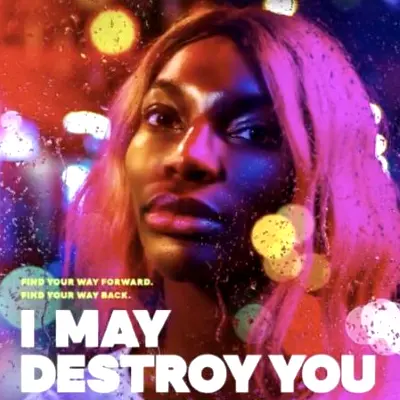Michaela Coel's I May Destroy You was refreshing in the way it tackled the psychological aftermath of rape
-

"I May Destroy You premiered amid a renewed debate about how film and television should depict rape and sexual assault — an issue that gained greater urgency after the #MeToo movement," says Inkoo Kang. "Traditionally, too many stories have underplayed female trauma by using a woman's rape primarily as an impetus for a male hero's actions. Other narratives have rendered sexual assault a metamorphosing event — or, perhaps more accurately, an annihilating one — in which victims become vengeance machines, as in the rape-revenge genre. Conspicuous is the absence of stories that reflect the humanity and resilience of survivors — and the spectrum of sexual assault that can make rape not just a deeply painful experience, but an unexpectedly confusing one, too. With I May Destroy You, Coel set out to tell a kind of rape narrative that had been seldom told before, one whose freshness is as striking as the show's Black British hipster milieu, its children-of-African-immigrants characters and its timely tale of a pop feminist writer who's woefully naive about male manipulation. The series is attuned to rape's many incarnations, including Zain's (Karan Gill) non-consensual condom removal, or 'stealthing' — an act that Arabella initially doesn't even realize constitutes sexual assault. The show is also sensitive to the relative privilege that law enforcement accords female victims like Arabella vis a vis gay (Black) men like her friend Kwame (Paapa Essiedu), who's further hampered by a hard-to-categorize sexual assault. Coel also dramatizes the excruciating unknowability of what happened to one's own body, as well as the equally under-discussed repeatability of sexual assault — an experience that baffles and torments Arabella." Kang adds: "I May Destroy You has been equally refreshing in its wide-ranging depiction of the psychological aftermath of rape, which for Arabella becomes a life-swerving incident, yet hardly the totality of who she is. Coel uses the expansive canvas of television to explore the many different thoughts, emotions and reactions Arabella undergoes in the year after her assault..."
ALSO:
- I May Destroy You was many shows in one: "In I May Destroy You," says Alison Herman, "the gap between character and creator serves a more poignant purpose. Arabella and Michaela aren’t just at different points in their careers. They’re also at different points in their recovery from sexual assault, a trauma Arabella undergoes in the premiere during an incident modeled after Coel’s real life. Because both Coel and her latest avatar are artists, each woman channels her experience into her work—and the differences in how they do so are the most instructive ones of all. I May Destroy You is many shows in one, to the point that focusing on any one aspect of the story almost feels reductive. It’s an observational sitcom about Black millennials. It’s a drama about assault, its aftermath, and all the nebulous forms it can take. But it’s also, to use an SAT word Arabella would surely scoff at, a Künstlerroman—a coming-of-age story with an artist at its center, tracking the growth of both a person and their creative voice."
- I May Destroy You proved that it was not just about anything: "In describing Michaela Coel’s harrowingly incisive series I May Destroy You, critics have been quick to proclaim it as something that is 'not just ______,'" says Joyce Chen. "It is 'not just' an HBO show about consent. It is 'not just' a series that weaves together themes of racism, drug use, Black queerness, friendship, shame, memory, social media, and intimacy. It is 'not just' anything, in part, because what it actually is is so hard to define. It is 'not just' anything because the hot orb that the entire series revolves around is truth—how to tell it, how to find it, and how to hide it from those we love and from ourselves. And in that sense, the series is 'not just' anything because it is actually about what’s at the core of everything; it’s about what happens when we confront the truths that hurt us the most."
- Michaela Coel has given victims of sexual assault, particularly Black women who have survived rape, some of the most radical and cathartic moments ever shown on television
- I May Destroy You is one of the few shows in the post-#MeToo era to really delve into the dynamics of race and queerness
- What I May Destroy You got about millennials that fellow HBO series Girls didn't
- I May Destroy You is a frank, mind-bending, heart-breaking look at the soul of its author
- The ending confidently meets the expectation Coel promises to the audience at the series' outset
- The finale of I May Destroy You doesn’t offer sanitized closure so much as an evolution of the self that involves radical empathy for ourselves and others
- I May Destroy You intimacy coordinator Ita O'Brien talks navigating scenes that may trigger or revisit trauma
TOPICS: I May Destroy You, BBC, HBO, Girls, Ita O’Brien, Michaela Coel
More I May Destroy You on Primetimer:- Presenting TV's best friendships, from Seinfeld to PEN15 to Insecure
- HBO is leaving Euphoria fans to fend for themselves after "traumatizing" them
- The miniseries has evolved from inside joke to becoming hugely popular in the streaming TV era
- Michaela Coel's Emmys speech dedicated to sexual assault survivors was something rare -- a speech directed at viewers, not attendees
